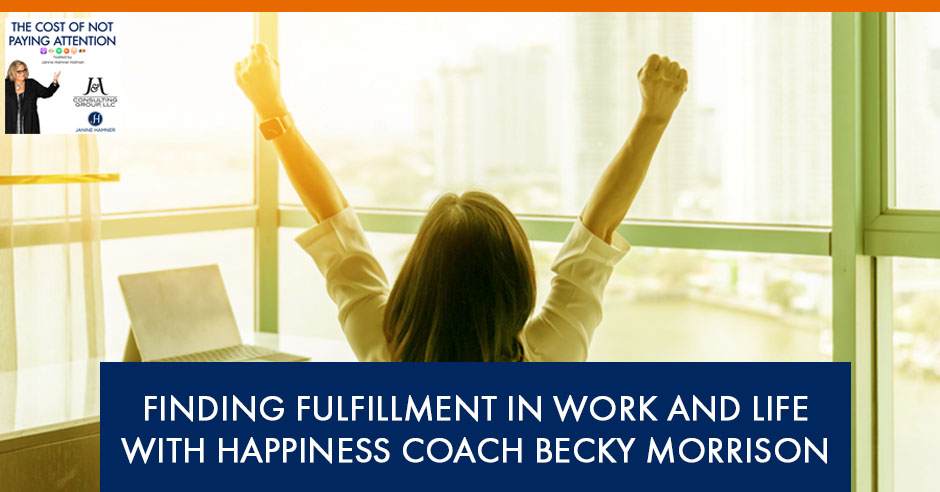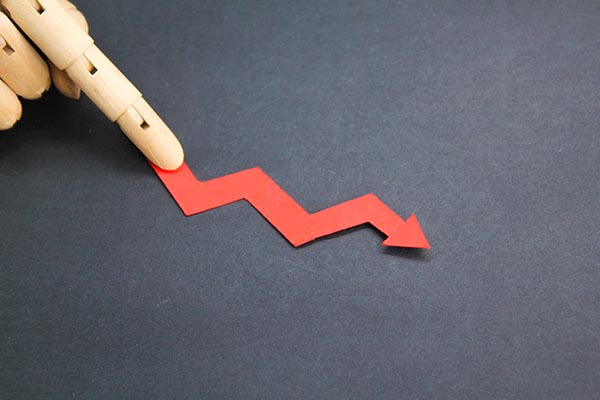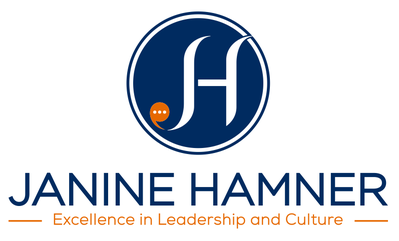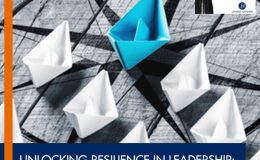
Finding fulfillment in both work and life is a journey of self-discovery and personal growth. In this episode, happiness coach Becky Morrison joins Janine Hamner Holman to discuss the importance of finding fulfillment in everyday life. Becky emphasizes reconnecting with our values and daily meaning amid societal pressures, drawing from her training in applied positive psychology. They explore “everyday grief,” highlighting how embracing it can deepen our relationship with loss. This conversation offers practical strategies and relatable anecdotes that inspire a shift in how we view fulfillment, showing that thriving comes from embracing the little things that bring joy and meaning to our daily lives.
GUEST: Becky Morrison | LinkedIn | Visit their Website: Untangle Happiness
HOST: Janine Hamner Holman | [email protected] | LinkedIn, Facebook, and Twitter | Subscribe to my Newsletter! | Book me to Speak!
—
Listen to the podcast here
Finding Fulfillment In Work And Life With Happiness Coach Becky Morrison
The Cost Of Inattention
Let me ask you a question. What do you do when you feel like you’ve achieved your goals and you still don’t feel happy? Even though Rebecca Morrison was a happily married mom and a lawyer with a two-decade-long career in big law and finance, she felt like something was missing. That feeling led her on a quest to figure out whether it was possible to be both successful and happy.
As a Happiness Coach and author of The Happiness Recipe: A Powerful Guide to Living What Matters, Becky helps successful but unsatisfied high achievers find their happiness recipe so that they can live happier, lead happier, and build happy businesses. Becky, what’s the one thing that you have realized, either within your business or with your clients? What’s the one thing that they have been failing to pay attention to? What’s the cost of that inattention? What’s the problem that that inattention is causing?
I think the way that I’d like to frame it for this conversation, and you can tell me if this is where you want to spend our time, is the one thing, in my mind, would be we don’t realize how much we’ve lost the attention to what really matters to us and have let that be overshadowed by, over-messaged by, I don’t know another way to say it, by the world, by what we are told should matter, by the measures that we are told should indicate that we are successful. I think it’s really like that loss of connection to self. That is the way I would describe it.
We don't realize how much we've lost the attention to what really matters to us. Share on XIt also sounds like maybe it’s the loss of that connection to vision or values or a mission that’s bigger than us.
I’ve done a lot of work to learn and get certified as an Applied Positive Psychology practitioner. The way we talk about it in that space is purpose and meaning, and values matter, too. That’s a part of the picture, but purpose and meaning are a big part of what allows us to thrive. Without going on too much of a tangent, purpose is sort of what we’re here on this earth at this time to do. We’ll probably never finish it in our lifetime. It’s not a finite thing. That’s like the flashing neon purpose. On the other end, you have meaning, and that’s like, why do we do what we do on a daily basis?
You can actually have meaning without purpose. In the middle, there’s what I’m calling like lowercase purpose, which is some of the bigger, loftier, meatier goals, raise good humans, finish a career, finish school, whatever the thing is. Those are purposes, but they will be finished in your lifetime. They do help create day-to-day meaning. What’s interesting about the science is it is entirely possible to thrive without knowing your Purpose.

Finding Fulfillment: Purpose and meaning are a big part of what allows us to thrive.
I think that’s neat because a lot of us, and I can remember feeling this way for much of my life, are like, why am I here? What am I doing? What is my purpose? Actually, looking for that neon purpose can create some anxiety and some unhappiness oftentimes. It happens for all of us in different ways, at different places, and in different paces. Oftentimes, that purpose finds us, we don’t find it, and it happens when it happens.
When we can set that down and say, “Okay, I might not know what the neon Purpose is, but in the meantime, I can focus on these lowercase purposes, these important things that I’m trying to accomplish. I can focus on finding meaning in my day-to-day.” That is going to be enough to feed my thriving. It’s not the only thing, by the way, to be clear, that goes into thriving, but it is an important component, having that meaning.
I love that. If we have time, I’m going to loop back to that, but in the meantime, what are the other components of thriving we forget about?
I want to use some words, and they’re big words, and there’s a lot underneath all of them, but the way that I think about thriving is the way that I learned it. That’s the model called PERMAV. P stands for positivity or positive emotional experiences. E stands for Engagement. R stands for Relationships. M stands for Meaning. We just talked about that.
A stands for Achievement. V stands for Vitality, which, in my mind, is everything. Not exclusively, but that’s where some of the physical well-being things that we think about live. All of those things go into thriving in various measures and in various ways and in various seasons of our lives. I like to think about those categories because it helps us think about when we’re not thriving, what might be missing.
I’m really curious about the interplay between circumstances in which we might find ourselves and something like positivity. My husband’s mom has stage-four breast cancer, which, if you’re going to get breast cancer, 91 is a pretty good time to get it. If you get it, why not get it then? Depending upon which family member you ask, she’s having some level of memory issues or full-blown dementia. Those circumstances make it very challenging with her. She’s a somewhat negative human being.
Positivity In Difficult Circumstances
As often happens in our older life, especially when memory issues become challenging, parts of our personality get blown up a little bit more. She’s a little more grumpy than she was at one point. I see my husband really struggling, and it’s definitely having an impact on his positivity. Because it’s having an impact on his positivity, then it gets to have an impact on my positivity. I’m really curious. When we find ourselves in these crappy circumstances, how can we lean in on our natural positivity? If you’re somebody like my husband who’s not so much with the natural positivity, what are ways to pull ourselves out of just being mired in those circumstances? We all have circumstances.
There are so many layers to the answer I want to give. I’m going to try to slow myself down and my brain down a little bit, but awesome. Let’s start here. One of the things that the science in the positive psychology space tells us is that, at least to some extent, our circumstances account for a lot less of our happiness than we think they do. There’s some research that says that if happiness were a pie, about 50% of it would be determined by our natural set point, how we are, how we came, how we arrived.
That is, in part, how we view the world, like how you were using positivity, but it’s also how we are wired. It is epigenetics. There’s a lot that goes into that. We’ll just say half the pie is off the table. It’s how we are. That’s a little bit artificial in the sense you can change. You can do some things to change your set point, but that’s not where the real leverage is. Let’s talk about the other half of the pie. The research says about 10% of the total pie, which would be a fifth of the other half, is based on our circumstances.
Do you know what the other 40% is? How we show up, our behaviors, our thoughts, our beliefs, our feelings, how we process emotions, and how we regulate our nervous system. It’s mindset and more. I want to be really careful because what I am not saying when I point out those statistics is, “When you’re faced with a crummy circumstance, please just think your way out of it.” That is not what I’m saying. That is not it. There is no universe in which crummy circumstances or negative circumstances don’t also come with emotions.
Actually, the first thing, at least when I work with my clients, that we talk about is how we are going to engage with those emotions. The other important thing is that chemically, the experience of any given emotion only lasts about 90 seconds. What we do is we think our way to the next emotion, and the next emotion, and the next emotion.
I see that.
This is my very scientific work with this. I’ve played with this myself. When I was learning about this stuff, it just so happened we were trying to sell a house.
A slightly stressful circumstance.
Stressful. We went under contract, and it was a great, like, dream offer, dream situation, just perfect. Forty-eight hours later, they pulled it, and I was like, “Okay, we’ll try this whole experience emotions thing.” I just sat, and I was like, “Well, how do I feel?” Okay, well, I’m sad. I asked myself, “Why am I sad?” As soon as I went into why I was sad, I thought myself into anger, and I thought myself into more frustration and more sadness. I said, “Wait, no, hold on. Let me try this a different way. Let me actually just name the emotion without getting into the why, or the how, or the who, or the what. Just name it. What do I feel? I feel sad. What do I feel? I feel worried. What do I feel? I feel tense. What do I feel?”
Do you know what? It didn’t take that long before I was pretty close to neutral. Did I get happy about it? No, but I got hopeful about it. I got practical about it. I got accepting of it. That’s just one. I’ve used that technique again since this time, what was it, three years ago? Absolutely. Does it work perfectly every time? No. Does it happen that quickly every time? No. Does my brain hijack me sometimes, or am I human? Yes. I just offer that as a way to begin to allow some of these emotions that many of us resist, which also just keeps us stuck longer, by the way. It’s like the, “I see sadness. I see you in the room, but I don’t want you here. I’m going to try to think myself happy or distract myself with something that feels good,” or whatever it is.
Actually, the first step in a tough situation is to own what’s happening, own your emotions. I think the next step is, I’m going to make up a name for it, but it’s control what you can control. By that, I mean, “Okay, this is the situation. This thing is going on. My offer on my house just fell through. My mom is struggling, and that’s on my mind, and it’s in my thoughts, and I’m having feelings about it, but where can I recapture some positive, not just positivity, but positive emotional experiences in my day?”

Finding Fulfillment: The first step in a tough situation is to own what’s happening. Own your emotions.
What I mean by positive emotional experiences is anything north of neutral on the emotional scale, peace, contentment, engagement, enjoyment, happiness, joy, any of those, love, you name it. It doesn’t have to be, like, over the top. It might just be, like you said, curiosity, engagement. What can I do here? Is it learning about something that might give me more tools? Is it really?
The other thing is to think about having a list of things at your fingertips that you can do when you need an injection of a positive emotional experience. Not a fake one. Not a manufactured one. Not a, “I’m going to try to see the bright side or see the glass half full.” You are wired either to do that or not, and it’s okay. Be you.
You also know there are things in your life that you enjoy, where you are content or peaceful when doing them. What are those things, and how can you access them quickly? I’m going to ask you a question. If you’re willing to play this game with me, what is something that falls into that category for you? Something that brings you north of neutral, a positive experience. It can be big or small, I don’t care.
The first two things that pop into my head are reading something fun. Not a workbook, not something intellectual, but something like watching videos of puppies and babies together, like, “Oh.”
There is nothing cuter. It’s okay.
It immediately popped into my head.
You went pretty micro and pretty accessible pretty quickly, but I want to dig a little deeper. Pick one of those two, I don’t care which one. I want you to tell me what it is about that that’s enjoyable for you.
I’ll go with reading something fluffy because puppies and babies seem intrinsic. It’s relaxing for me. It’s getting out of my day-to-day experience and circumstances and into somebody else’s day-to-day experience and circumstances, which, because it’s a fluffy book, are often funny, or there’s some late romance going on, or there’s some adventure thing going on, like running from bad guys or whatever is happening.
I won’t push. I won’t belabor the point. Ordinarily, I’d ask you that question 3 or 4 more times, “What is it about that that is enjoyable to you?” Where I want to get with asking that question multiple times is if you don’t have a fluffy book ready at your fingertips that you’re already in the middle of, how do you access that feeling?
The honest answer to that is I always have something at the ready.
There you go, problem solved.
Either on my iPad that I’m reading, or a physical book that I’m reading because I really like the tangible feel of a physical book, or I’m listening to it on Audible.
Awesome, perfect. If you didn’t have it at the ready, an easy answer for those of us who maybe don’t have it at the ready is, “What’s your favorite book? There’s one you’ve read before that you’d read again willingly.” Pick up that book, pick a page, and read it for five minutes. I think that you could take what we just did here, and you could actually do it with 5 or 10 things and really get to the base. I’ll give you a silly example from my world. There is nothing that I love more than clean sheets. I don’t know why, but it makes me extraordinarily delighted to get into a clean bed with clean pajamas on and clean sheets. There’s nothing better.
If I’ve had a bad day, I’m going to change my sheets. Why not? It’s like a low-hanging fruit way to ensure that I’m putting some deposits of a positive nature into my emotional piggy bank. The key is not to wait until you’re in the yucky circumstances to begin making those deposits. If we can actually be more intentional about making daily micro-deposits, what we do scientifically is we both have a better day and have positive experiences, but two other important things happen.
We broaden our worldview, allowing us to be more creative in solving problems and better at building relationships. There are all kinds of side effects that come from that. It deepens our reserve of resilience. The more we can deposit into that positive emotional piggy bank, the more resilient we are when the yucky stuff comes around.
The more we deposit into our positive emotional piggy bank, the more resilient we become when challenges arise. Share on XThe fact that the last thing I do almost every night is read a little bit in my fluffy book. If I go anywhere in my car, I am listening to a different fluffy book. I am actually making deposits in my resilience and positivity bank that are going to help me weather some of the circumstances.
Do you know how you can make a donation to charity sometimes, and your company will match your donation? If you want a matching deposit in that piggy bank, there are two other things you can do. Sweet. One is to actually take note of the fact that you’re enjoying that book. Savor it a little bit. That’s its own deposit. Extra credit, share it with someone else.
Share the book or share the experience?
Share the experience. Share the happiness, or the curiosity, or the peace, or the engagement, or whatever it is. For me, I had the best time playing with my dogs. It was so much fun. They’re so goofy, and they put such a smile on my face. Just by telling you that, it’s like, cha-ching, another deposit.
Part of that, then, is about spreading the happiness. It’s not just you who wants me to have the kick that I get hearing about you playing with your dogs. It’s that you get an additional deposit in the bank as well.
It’s all connected. Remember I said that the R in PERMAV stands for relationships? The more that we’re sharing these positive moments with each other and that you’re expressing positive empathy with me when I come to you and say, “I had the best time playing with my dogs.” That smile that you got on your face tells me you’re connected with that. That’s just building that web of things that help support us in thriving. That helps us when we’re in those tough moments when we do those things, but it also helps us prepare for future tough moments.
Everyday Grief
This is so fascinating. One of the things that it has me thinking about is preparing for future tough moments. Like many of us who get to be a certain age, parents are also getting to be a certain age. I just spoke about Jonathan’s mom. I have a very different relationship with my parents. I’m very close to my parents, and they were out here in California from Massachusetts, where they live, several months ago. I got to have a conversation with my mom, and we were talking about the winding down of life that’s happening. I can’t talk about it. Right now, I can’t talk.
You’re already feeling it.
Without getting a lump in my throat. I am a human who is very easily in touch with my emotions. My mom and I are having this conversation, and I’m still having the conversation, and there are tears coming down my cheeks. She puts her hand on mine and says, “Oh, honey.” I said, “Well, but here’s the thing. The only downside of having a great, amazing relationship with your parents is that it’s going to impact me when you’re gone. Would I rather have had an amazing many decades of relationship with you and have a really hard time when you’re gone, or had a really shitty relationship with you?”
Not care.
Whatever. I think a lot, well, a lot is not the right word, but I think about how to prepare myself for that coming reality.
There are many things I want to say, but let me start with these two. Number one, the downside of love is always loss. Number two, there is something important in what you’re sharing about allowing grief to be present before, during, and after. We actually have so much experience with grief that we don’t acknowledge.

Finding Fulfillment: The downside of love is always loss.
Tell me more about that because I feel like, in general, we do a bad job.
We are terrible. Terrible. That’s because we only really talk, and I’m being super general, but like we, the general population, only ever talk about grief in the context of significant loss. In my opinion, anytime our relationship with something changes, there is grief there. Anytime our expectations are not met, there is grief there.
That’s so brilliant because one of the things I work with organizations on is change management. One of the things that I say is we forget that there are these stages that we all get to go through. In an organization, often, by the time that the change is rolled out to everybody in the organization, the change-makers have been working on and noodling with and figuring out and trying and changing and iterating for a long time. They roll out the change, and they’re like, “Okay, here we go. Change, ready, go.” They forget that people need time to let go and grieve the old thing. “I knew how to do that.”
Even if it’s not that big of a deal, like, “I knew how to do that, and now I’m going to have to learn this whole other thing.” We get to grieve the loss of the thing, whatever it was. There’s always some sticky middle where we’re having a series of feelings about all of it, and then we embrace the change. I love that you’re pointing out it’s not just the big transitions. It’s all of the transitions that we go through, that there’s a process of grief.
It’s transitions that are welcome. Let’s also be clear about that. It’s the conditions that we choose.
It’s like you’re having a baby, you’re getting married, you got a puppy, like all these things that you’re excited about, but the life that you had.
It isn’t there anymore. It’s the book I haven’t written yet. I’ve joked that it’s my next book. It’s called Everyday Grief. I don’t know if that’ll really be the next book or a chapter in the next book. I really feel like if we could embrace our grief every day. We would have a different relationship with grief in a meaningful way that would impact how grief is for us as individuals and society when the big grief happens. It wouldn’t solve it.
Embracing our grief every day could foster a more meaningful relationship with it, affecting us as individuals and society when the big grief happens. Share on XYou’re still going to feel what you feel. You’re going to be so much more used to it being messy, being complicated and having multiple sides to it, being a process, to seeing yourself go through the whole process, knowing that you can navigate it. It’s not like, “Here I am. This big thing has just happened to me. It’s my first encounter with this thing.” It’s not your first encounter. You’ve actually been doing it your whole life. How does it look different when you can own that?
I love that. Please write that book.
Maybe. For me, it’s been a really powerful learning. As you’re describing change management and organizations, what I heard is you’re absolutely right. By the time it’s getting rolled out to the whole, if you want to talk about stages of grief, the people rolling it out have already gotten to acceptance. You’re talking to a population who’s, at the very beginning, denial, bargaining, anger. You know what I mean? Allowing them the space to do that, to have those feelings, to grieve, is a huge part of the emotional heavy lifting that has to happen with change management.
Becky, this has been a fantastic conversation. I’m really working on having my episodes be about 30 minutes.
That’s the right length. I co-sign. I’m here for that.
Closing
I get to have conversations with people that I find fascinating, and I just want to keep talking. I’m going to put a cap on it and say thank you so much. Thank you for your wisdom and your insights. You’ve said a number of times what science tells us, which just always makes me smile. I love when we can bring that scientific information into people’s experience. Thank you for bringing the happy into some challenging domains that we’ve been talking about. Thank you for having the smile on your face that you’ve had all through this conversation, which is enabling me to have a smile on my face.
Thank you for inviting me to talk. This has been really fun. I want to thank you and recognize you for sharing openly and authentically in a way that I know, I could feel it, I can relate to it. I know that that’s probably true for the folks listening too. Life is messy and complicated and beautiful, and we need to let it be all those things.
Remember, great leaders make great teams. Until next time.
Important Links
- Rebecca Morrison
- The Happiness Recipe: A Powerful Guide to Living What Matters
- Rebecca Morrison – Instagram
- Rebecca Morrison – LinkedIn
About Rebecca Morrison
 What do you do when you’ve achieved your goals yet you still don’t feel happy?
What do you do when you’ve achieved your goals yet you still don’t feel happy?
Well, even though Rebecca Morrison was a happily married mom and lawyer with a two-decade career in BigLaw and Finance, she felt something was missing. That feeling led her on a quest to figure out whether it was possible to be both successful and happy.
Now a Happiness Coach and Author of The Happiness Recipe: A Powerful Guide to Living What matters, Rebecca helps successful but unsatisfied high achievers find their happiness recipe so they can live happier, lead happier and build happy businesses.
Rebecca is a graduate of Wellesley College and Georgetown Law. She is also a UC Berkeley Executive Coaching Institute Certified Executive Coach and a Certified Applied Positive Psychology Practitioner.





